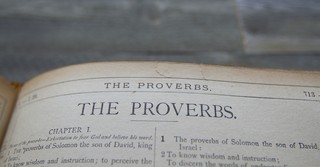Why Is It Such a Bad Thing to Be a Fool?
Share

What does it mean to be a fool? Honestly that is one word no one wants to be associated with. The Bible makes a clear distinction between the one who is wise and the one who is foolish. While wisdom has the potential to impact every aspect of your life, being a fool can do the same thing. I believe it is important to know what the Bible say about fools so that by God’s grace we don’t end up being one.
Photo credit: ©Getty Images/Yifei Fang
What Does the Bible Say about Fools?

There are different ways the Bible describes a fool. I am going to take much of what the Bible says about fools and define it by three things.
1. A Fool Denies the Existence of God
“The fool says in his heart, ‘There is no God.’ They are corrupt, their deeds are vile; there is no one who does good” (Psalm 14:1).
The reason this is foolish is because they deny the evidence that is within them and the evidence that is all around them. Consider these passages:
“The heavens declare the glory of God; the skies proclaim the work of his hands” (Psalm 19:1).
“The wrath of God is being revealed from heaven against all the godlessness and wickedness of people, who suppress the truth by their wickedness, since what may be known about God is plain to them, because God has made it plain to them. For since the creation of the world God’s invisible qualities — his eternal power and divine nature — have been clearly seen, being understood from what has been made, so that people are without excuse. For although they knew God, they neither glorified him as God nor gave thanks to him, but their thinking became futile and their foolish hearts were darkened. Although they claimed to be wise, they became fools” (Romans 1:18-22).
The Bible clearly teaches us proof of God’s existence is literally all around us. God has made it abundantly clear that he exists, so it makes sense that the one who thinks otherwise would be classified as a fool. They are denying evidence that is right in front of them.
Photo credit: Unsplash/Aaron Burden
2. A Fool Denies Their Need of God

“Do not be wise in your own eyes; fear the Lord and shun evil” (Proverbs 3:7).
“Fools mock at making amends for sin, but goodwill is found among the upright” (Proverbs 14:9).
One of the biggest mistakes the fool makes is they often have an inflated opinion of themselves. This can cause them to miss their own sinful condition and to depend on their goodness and even their own righteousness. This lack of true sin awareness blinds them to their need for God. A classic example of this is told by Jesus in the parable of the Pharisee and the tax collector.
“To some who were confident of their own righteousness and looked down on everyone else, Jesus told this parable: ‘Two men went up to the temple to pray, one a Pharisee and the other a tax collector. The Pharisee stood by himself and prayed: ‘God, I thank you that I am not like other people — robbers, evildoers, adulterers — or even like this tax collector. I fast twice a week and give a tenth of all I get.’ ‘But the tax collector stood at a distance. He would not even look up to heaven, but beat his breast and said, ‘God, have mercy on me, a sinner.’ ‘I tell you that this man, rather than the other, went home justified before God. For all those who exalt themselves will be humbled, and those who humble themselves will be exalted” (Luke 18:9-14).
It is safe to say the Pharisee was foolish for trusting in his own righteousness.
3. A Fool Rejects the Wisdom of God
“The fear of the Lord is the beginning of knowledge, but fools despise wisdom and instruction” (Proverbs 1:7).
“Woe to those who are wise in their own eyes and clever in their own sight” (Isaiah 5:21).
Another big problem the fool has is the dependence on their own wisdom. If you know everything (which no one really does) then you believe you don’t need any other wisdom, especially the wisdom of God. This leads to a form of self-deception. Of all the people who walk the earth, the one who is foolish is possibly more deceived than anyone else.
Photo credit: ©Getty Images/Deagreez
Wisdom from Proverbs about Fools

One of the best places to consider what the Bible says about fools is the book of Proverbs. I don’t know if there is another book that talks more about fools and folly than Proverbs. For this reason, let me share with you ten verses from Proverbs about fools.
“The wisdom of the prudent is to give thought to their ways, but the folly of fools is deception” (Proverbs 14:8).
“The tongue of the wise makes knowledge appealing, but the mouth of a fool belches out foolishness” (Proverbs 15:2, NLT).
“Fools find no pleasure in understanding but delight in airing their own opinions” (Proverbs 18:2).
“The lips of fools bring them strife, and their mouths invite a beating. The mouths of fools are their undoing, and their lips are a snare to their very lives”(Proverbs 18:7-8).
“A person’s own folly leads to their ruin, yet their heart rages against the Lord” (Proverbs 19:3).
“The way of fools seems right to them, but the wise listen to advice. Fools show their annoyance at once, but the prudent overlook an insult” (Proverbs 12:15-16).
“Fools give full vent to their rage, but the wise bring calm in the end” (Proverbs 29:11).
“Those who trust in themselves are fools, but those who walk in wisdom are kept safe” (Proverbs 28:26).
“Better to meet a bear robbed of her cubs than a fool bent on folly” (Proverbs 17:12).
“Even fools are thought wise if they keep silent, and discerning if they hold their tongues” (Proverbs 17:28).
Photo credit: ©SparrowStock
How Can We Pursue Wisdom, not Foolishness?

I believe it is safe to say that after reading those Scriptures – and there are a lot more – you want no part of being a fool or being foolish. The question then is how do we pursue wisdom so that we don’t become foolish? Here are three simple suggestions.
1. Humble Yourself
Pursuing wisdom begins with recognizing you need it and don’t have it. Earlier, we mentioned Proverbs 1:7, “The fear of the Lord is the beginning of knowledge, but fools despise wisdom and instruction.”
Why is this fear so important? Because it allows you to see yourself in the right light. God is all wise and all-knowing and you are not. Recognizing he is the source of all wisdom, and you are not, keeps you humble and in position to pursue wisdom.
2. Ask for It
“If any of you lacks wisdom, you should ask God, who gives generously to all without finding fault, and it will be given to you” (James 1:5).
The good news is we don’t have to lack wisdom. We just have to ask for it. God already knows we are lacking in wisdom because life is filled with so many decisions. He is willing to give what we need and all we must do is ask for it.
3. Seek It Out
“Without wise leadership, a nation falls; there is safety in having many advisers” (Proverbs 11:14, NLT).
“Walk with the wise and become wise, for a companion of fools suffers harm” (Proverbs 13:20).
The last step in pursuing wisdom is surrounding yourself with wise people. No one except God has ownership of all wisdom. If you want to be wise, you will make sure there are people around you who possess a measure of wisdom and who are willing to share it with you.
The Bible gives many verses and many demonstrations of wise and foolish people. If you are wise, you will study the choices of others and use that as a model to make better choices for yourself. After all, wisdom is when your knowledge is applied in the everyday decisions of life. As you continue in life, pursue wisdom, because I can honestly say I need more wisdom and I trust you do too.
“Do not forsake wisdom, and she will protect you; love her, and she will watch over you” (Proverbs 4:6).
Photo credit: ©Getty Images/BrianAJackson

He is the author of The Pursuit of Purpose, which helps readers understand how God leads them into his will, and the author of The Pursuit of Victory: How To Conquer Your Greatest Challenges and Win In Your Christian Life. Clarence is also committed to helping 10,000 people learn how to study the Bible and has released his first course, Bible Study Basics, to achieve that goal. To learn more about his ministry and resources, please visit clarencehaynes.com.